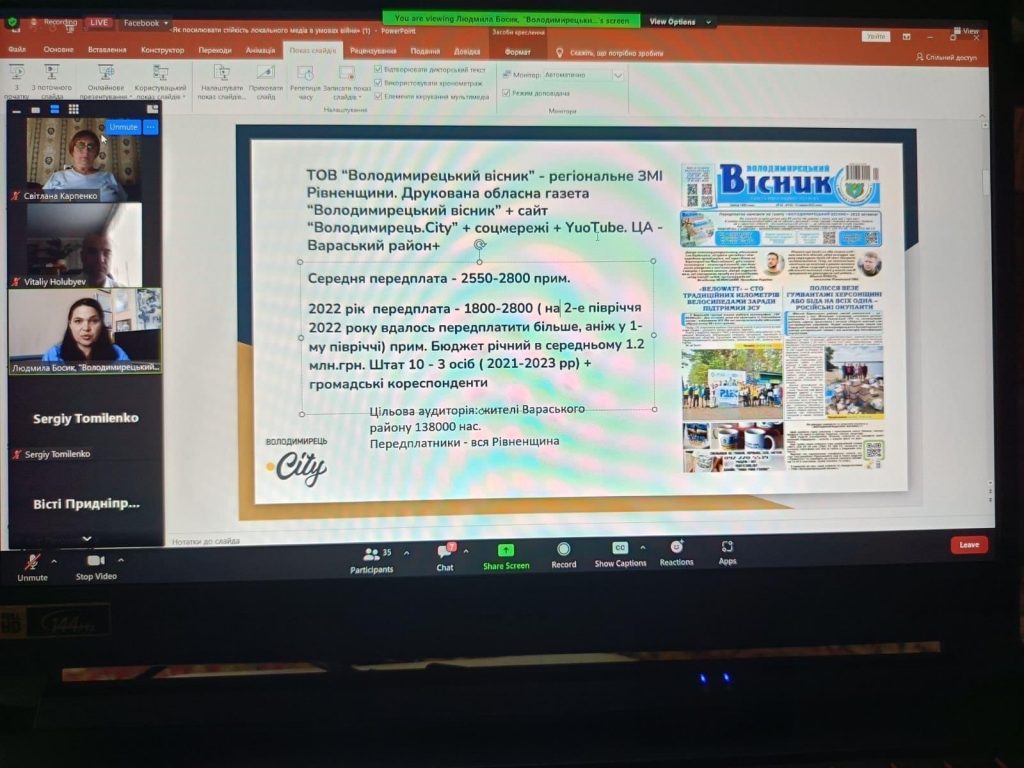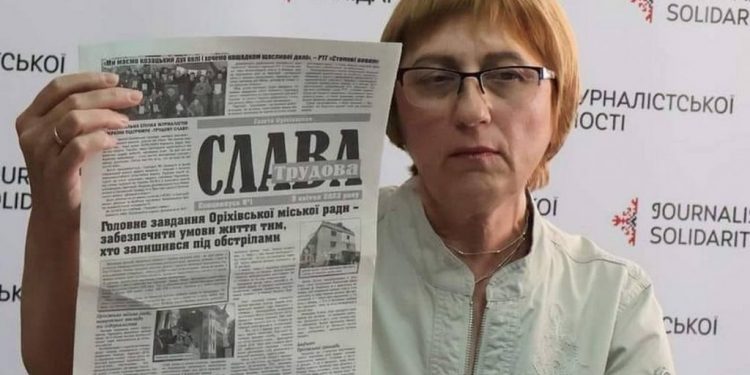With the support of UNESCO and the Japanese government, at the end of May, the National Union of Journalists of Ukraine (NUJU) launched the educational and educational project Steps To Sustainable Development, aimed at supporting local media from the frontline and de-occupied territories. The training format is online events (seminars, lectures) on the economic stability of print media. The project is aimed at helping each publication get on its feet, modernize content creation approaches, gain knowledge about digital platforms for media promotion, and search for new opportunities.
Twenty-seven print publications, divided into groups, participate in the training for three months. Among them is the Trudova Slava newspaper from Orikhiv. The participants in a conversation with the editor-in-chief of the publication, Svitlana Karpenko, which took place at the Zaporizhzhia Journalists’ Solidarity Center (JSC) of the NUJU talked about the training and impressions of the project.
“The trainers are experienced colleagues with a lot to share, in particular, Kostiantyn Hryhorenko, the editor-in-chief of the Obrii Iziumshchyny newspaper; Yuliya Surkova, a war correspondent and representative of the France Press news agency; Andrii Yurychko, a journalist/media trainer of the Academy of Ukrainian Press,” notes Svitlana Karpenko.
Please, tell me, which training sessions have you already attended?
“First, there was a meeting with the mentor Andrii Yurychko, who familiarized himself with the capabilities of each newsroom, asked questions, and got to know about newspapermen’s problems they’d like to solve in digitalization. There also were lectures on the following topics: Advertising Projects Beyond Newspapers Themselves; Journalistic Ethics. Peculiarities Of Working With Children As Heroes And Traumatized People; and Interactive Journalism: Optimization Through Digitalization Of Newsroom’s Work.”
What was the most interesting for you?
“All webinars were meaningful and very interesting. After all, each coach offered the tools they use. That is, they are all quite practical and effective.”
What of the acquired knowledge has already been put into practice?
“I have decades of working experience in the newspaper. I always try to obey journalistic ethics. This is especially important now. After all, we communicate with people who have experienced personal tragedies. It is not an easy task not only for the respondent but also for the journalist. This is where Yuliya Surkova’s advice comes in handy.”
What else awaits you ahead?
“Great work. The training continues… The time will come, and we will return to our territory; for now, there are still hostilities there. We will have to re-conquer the advertising market, regain readers’ trust, work up subscriptions, and look for additional sources of income. And this is where Kostiantyn Hryhorenko‘s experience will come in handy.”
Obrii Iziumshchyny offers advertisers comprehensive services, which include placing information not only in the newspaper but also on the website and in social networks: Facebook, Instagram, YouTube, and Telegram, as well as on printed products (posters, calendars, plans, diagrams, etc.).
As for the digital component of our publication, we will have to start from scratch. Kostiantyn Hryhorenko‘s approaches and Andrii Yurychko‘s experience and advice will help us here. I hope the acquired knowledge will help our local newspaper team recover and modernize content creation approaches.
Thanks to the NUJU, which managed to involve UNESCO and the Japanese government, which support the Steps To Sustainable Development project as very important and necessary.
Call the Zaporizhzhia JSC by dialing 096 277 5352 (Nataliya Kuzmenko and Valentyna Manzhura, the JSC coordinators). The Center’s address is 152 Sobornyi Avenue.

About JSCs
The Journalists’ Solidarity Centers is an initiative of the NUJU implemented with the support of the International and European Federations of Journalists and UNESCO. The initiative is designated to help media representatives working in Ukraine during the war. The Centers operate in Kyiv, Lviv, Ivano-Frankivsk, Chernivtsi, Zaporizhzhia, and Dnipro and provide journalists with organizational, technical, legal, psychological, and other types of assistance.
About UNESCO
UNESCO is the United Nations Educational, Scientific, and Cultural Organization. It contributes to peace and security by promoting international cooperation in education, sciences, culture, communication, and information. UNESCO promotes knowledge sharing and the free flow of ideas to accelerate mutual understanding. It is the coordinator of the UN Action Plan on the Safety of Journalists and the Issue of Impunity, which aims to create a free and safe environment for journalists and media workers, thus strengthening peace, democracy, and sustainable development worldwide. UNESCO is working closely with its partner organizations in Ukraine to provide support to journalists on the ground.
The designations employed and the presentation of material throughout this digest do not imply the expression of any opinion whatsoever on the part of UNESCO concerning the legal status of any country, territory, city, or area or its authorities or concerning the delimitation of its frontiers or boundaries.
The authors are responsible for the choice and the presentation of the facts contained in this digest and for the opinions expressed therein, which are not necessarily those of UNESCO and do not commit to the organization.
Mariya Honcharenko

 THE NATIONAL UNION OF
JOURNALISTS OF UKRAINE
THE NATIONAL UNION OF
JOURNALISTS OF UKRAINE
















Discussion about this post